My favorite books: and why I love them
In a series of posts, called ask berkun, I write on whatever topics people submit and vote for. This week reader’s choice: What are your favorite books and why?
These are the first ~45 books that came to mind (here’s the list on goodreads) .
 Henry Miller wrote a book called The Books in My life. I was a fan of his non-fiction writing in the late 1990s (Air Conditioned Nightmare, Black Spring) and when I found this book it blew my mind. The quantity of books he recalled fluently, and their wide range of genres. changed how I thought about reading. He crossed subjects, forms, languages, decades… he was, in essence, a kind of free-reader. I discovered Celine’s Death on the Installment plan from Miller, a book with profound effects – a) the realization some people are both brilliant and miserable b) sentences don’t have to end… Regarding Miller, I’d never seen a writer list more than a handful of favorite books, but Miller’s book was dense and deep, thick with references. I realized it’s not only okay to read widely, but a kind of necessity as a writer to be well read, as demonstrated by his example. He read lots of obscure books, by not well known writers, which liberated me from the shallow waters of bestseller lists. This post is largely inspired by this book.
Henry Miller wrote a book called The Books in My life. I was a fan of his non-fiction writing in the late 1990s (Air Conditioned Nightmare, Black Spring) and when I found this book it blew my mind. The quantity of books he recalled fluently, and their wide range of genres. changed how I thought about reading. He crossed subjects, forms, languages, decades… he was, in essence, a kind of free-reader. I discovered Celine’s Death on the Installment plan from Miller, a book with profound effects – a) the realization some people are both brilliant and miserable b) sentences don’t have to end… Regarding Miller, I’d never seen a writer list more than a handful of favorite books, but Miller’s book was dense and deep, thick with references. I realized it’s not only okay to read widely, but a kind of necessity as a writer to be well read, as demonstrated by his example. He read lots of obscure books, by not well known writers, which liberated me from the shallow waters of bestseller lists. This post is largely inspired by this book.
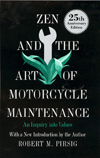 Zen and the Art of Motorcycle Maintenance, By Robert Pirsig. As a warning this is a book with major problems. It’s too long and it meanders in frustrating ways. If I weren’t assigned to read it for a freshman year philosophy class, I’d likely never have, and it’s not a book I often recommend. But it has it’s potent charms – it was the first book of philosophy I’d read that was first person and personal, and it left me with new ways to think about thinking about things and the dangers thinking about thinking can bring (I will always remember gumption traps). For this reason I’ve returned to the book many times (and read Lila too, which I enjoyed but for different reasons). In the same college course I read Crazy Wisdom, by Wes Nisker, which demonstrated how insane wisdom seems to the unwise (which i was, or still am). The combination of these two books changed me forever, and set me on a path paved with the love of wisdom. I learned wisdom and philosophy could be funny, angry, scary, fulfilling, emptying, and dozens of other things I’d never thought about philosophy before.
Zen and the Art of Motorcycle Maintenance, By Robert Pirsig. As a warning this is a book with major problems. It’s too long and it meanders in frustrating ways. If I weren’t assigned to read it for a freshman year philosophy class, I’d likely never have, and it’s not a book I often recommend. But it has it’s potent charms – it was the first book of philosophy I’d read that was first person and personal, and it left me with new ways to think about thinking about things and the dangers thinking about thinking can bring (I will always remember gumption traps). For this reason I’ve returned to the book many times (and read Lila too, which I enjoyed but for different reasons). In the same college course I read Crazy Wisdom, by Wes Nisker, which demonstrated how insane wisdom seems to the unwise (which i was, or still am). The combination of these two books changed me forever, and set me on a path paved with the love of wisdom. I learned wisdom and philosophy could be funny, angry, scary, fulfilling, emptying, and dozens of other things I’d never thought about philosophy before.
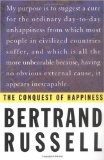 The Conquest of Happiness, Bertrand Russell. Not sure how or when I discovered Russell, but he’s one of my strongest influences. The best writer among the philosophers, choosing plain language, passionate charm, and clarity of thought above all else, something few philosophers have the talent, desire or courage to do. He was prolific, with many essay collections, but perhaps most memorable among them is his Why I am Not Christian. He is one of my heroes for many reasons, but with this book it was for his willingness to state what he believed despite the consequences. Conquest of Happiness is a very silly title, it’s like “how to force the boy/girl of your dreams to love you” or something – the title, but not the book, suggests a self-defeating strategy. But the book has saved me in times of depression, and was a key reading while I was figuring out how to quit my job.
The Conquest of Happiness, Bertrand Russell. Not sure how or when I discovered Russell, but he’s one of my strongest influences. The best writer among the philosophers, choosing plain language, passionate charm, and clarity of thought above all else, something few philosophers have the talent, desire or courage to do. He was prolific, with many essay collections, but perhaps most memorable among them is his Why I am Not Christian. He is one of my heroes for many reasons, but with this book it was for his willingness to state what he believed despite the consequences. Conquest of Happiness is a very silly title, it’s like “how to force the boy/girl of your dreams to love you” or something – the title, but not the book, suggests a self-defeating strategy. But the book has saved me in times of depression, and was a key reading while I was figuring out how to quit my job.
The Consolations of Philosophy by Alain DeBotton is in the same Russellian category for its charmingly written take on the basics of wisdom. It’s often the first book of philosophy I recommend to people. In the same line is Leo Buscalia’s Living, Loving and Learning, a book recommended to me while drinking with a greek man I met in the youth hostel near Bannf. Between shots of whiskey, I asked for the book he thought I needed to read and that’s what he wrote down. And he was right. The book taught me that love is courageous, and most people are afraid of expressing their love, which explains in part why many people are sad. In the same pile belongs An Intimate History of Humanity by Zeldin, which made me rethink what a book was, and demonstrated chapter titles don’t have to be so boring all the time.
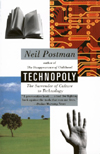 Technopoly, By Neil Postman. If you’re wise, you read challenging books. You’ll be uncomfortable, but it’s the only way to learn. This is the book I wish every technology lover, programmer, startup founder and tech VP would read. Postman’s Amusing ourselves to death should come with every television set, by law. His books made me realize my lust for using and making technology could not achieve many of the things I wanted out of life. It led me to books like Information Anxiety, The end of patience and Data Smog By Shenk, and on down the line through an honest view of what technology can and can not do. A design student I was on a project team with at CMU got me hooked on Postman, and I’m in his debt. Without Postman I’d likely still be working managing software development, and I’d never have become a writer.
Technopoly, By Neil Postman. If you’re wise, you read challenging books. You’ll be uncomfortable, but it’s the only way to learn. This is the book I wish every technology lover, programmer, startup founder and tech VP would read. Postman’s Amusing ourselves to death should come with every television set, by law. His books made me realize my lust for using and making technology could not achieve many of the things I wanted out of life. It led me to books like Information Anxiety, The end of patience and Data Smog By Shenk, and on down the line through an honest view of what technology can and can not do. A design student I was on a project team with at CMU got me hooked on Postman, and I’m in his debt. Without Postman I’d likely still be working managing software development, and I’d never have become a writer.
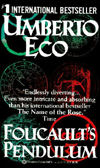 I didn’t read much from age 8 to 18 (curiously I’ve read voraciously before and after this period – I blame girls and sports) and A Separate Peace, by John Knowles was likely the first novel I that moved me. I hadn’t felt anything that personal in a book before. Not sure what grade it was, probably early high school, but in that experience was likely one of the seeds that made me eventually want to be a writer. These days I read about 90% non-fiction to 10% fiction – most fiction tries way to hard to seem real, and I find it unreadable. Other favorite novels include Slaughterhouse 5, The Life of Pi, Catcher in the Rye, Fahrenheit 451, and The Hobbit. I’m also very fond of George Saunders, and his short story collection Pastorallia, short story collections being a kind of book I typically loathe.
I didn’t read much from age 8 to 18 (curiously I’ve read voraciously before and after this period – I blame girls and sports) and A Separate Peace, by John Knowles was likely the first novel I that moved me. I hadn’t felt anything that personal in a book before. Not sure what grade it was, probably early high school, but in that experience was likely one of the seeds that made me eventually want to be a writer. These days I read about 90% non-fiction to 10% fiction – most fiction tries way to hard to seem real, and I find it unreadable. Other favorite novels include Slaughterhouse 5, The Life of Pi, Catcher in the Rye, Fahrenheit 451, and The Hobbit. I’m also very fond of George Saunders, and his short story collection Pastorallia, short story collections being a kind of book I typically loathe.
Enders Game, the book everyone at CMU was reading in ’92, provided a profound experience similiar to A Separate Peace (“ah ha! now i get the concept of reading for pleasure”), but for more cerebral reasons. Foucault’s Pendulum was the most complicated novel I’d read ever in a single sitting in the mid 90s, and I’ve read it more than once trying to figure out why. Hitchiker’s guide to the galaxy was Monty Python in space, and I devoured the series. I read it many times also trying to figure out the machinery. I will always remember the endings of Updike’s Rabbit Run, and Malamud’s The Natural, even though I didn’t particularly enjoy either book – the later allowed me to discover how any story can be many different stories with just a few surgical changes (e.g. the movie is a different beast).
The Night Country, by Loren Eiseley. I found this strange, scary looking book cover in the science section of a used bookstore in the mid 90s. I picked it up and and it blew me away, because although it pretended to be a science book, his magical sense of wonder was unexpected and put me on my heels. I’d go on to read many of his books (The Star Thrower, All The Strange Hours, The Firmament of Time… what great titles) paying attention to how me made everything seem interesting, mysterious and wonderful simultaneously. I’ve written about Eisley before. He was the first essayist I read, and i soon discovered Emerson, devouring his collections (I’ve read self-reliance a dozen times or more), and wandering my way towards Montaigne, Thoreau, and other classics.
The Best American Essays series, which has profoundly effected my writing (Why there isn’t a best world essays series, I have no idea). These books provide a crash course in the various short non-fiction forms there are, and gave me exposure to different writers, writing on very different topics, in very different styles. I owe a great debt to this line of books – it was part of my self-directed poor man’s creative writing / English degree.
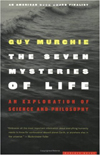 The Seven Mysteries of Life, by Guy Murchie, opened my mind wide. I hadn’t had a reading experience that crossed so many lines, and was both brutal and loving, scientific and personal, rational and spiritual, all at the same time. Transformational. I didn’t know books could be like this. And it had these wonderful line drawings by the author that, unlike other books, had a love and soul in them I hadn’t seen before. A Scientist in the City, by James Trefill. Much of my reading used to be focused on design, design thinking, and building good things, since that was a big part of my working life. Trefill was my favorite science writer for a long stretch, and this was my introduction to him. He walks through a city, deconstructing skyscrapers, highways and landscapes from the view of the science mind.
The Seven Mysteries of Life, by Guy Murchie, opened my mind wide. I hadn’t had a reading experience that crossed so many lines, and was both brutal and loving, scientific and personal, rational and spiritual, all at the same time. Transformational. I didn’t know books could be like this. And it had these wonderful line drawings by the author that, unlike other books, had a love and soul in them I hadn’t seen before. A Scientist in the City, by James Trefill. Much of my reading used to be focused on design, design thinking, and building good things, since that was a big part of my working life. Trefill was my favorite science writer for a long stretch, and this was my introduction to him. He walks through a city, deconstructing skyscrapers, highways and landscapes from the view of the science mind.
Murchie, Eisley and Trefill all showed me how a great writer can reveal a subject more powerfully by carefully including themselves in their descriptions of the world. That it wasn’t indulgent if you used a careful hand. Stewart Brand’s How Buildings Learn deserve mention, as he offered a a new way to look at architecture that was fascinating, personal, real and practical, and mostly pretension free, something I can’t say about many books on architecture and design or most creative pursuits. All these books draw parallels between nature and engineering, a potent comparison for many reasons.
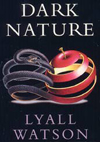 Dark Nature, by Lyall Watson. For many years I read lots of science books, and this was a pivotal one. It explained a scientific view of evil, or rather how there really isn’t one, and how subjective and immature my view of good and evil was. I read The Lucifer Principle, by Howard Bloom, also excellent, which doubled the potency. Both books opened up my perception to a new view of nature, one in which we have invented a system of thinking that has very little to do with the way the ecosystem of the planet functions. Good and evil, like most of our ideas, are inventions, and have varying levels of accuracy in how they map to the world. To be wise, and aware, means deconstructing the ideas I use to map to the world, and realizing not only how many different ones there are, but that they all, in degrees, inform us about the world.
Dark Nature, by Lyall Watson. For many years I read lots of science books, and this was a pivotal one. It explained a scientific view of evil, or rather how there really isn’t one, and how subjective and immature my view of good and evil was. I read The Lucifer Principle, by Howard Bloom, also excellent, which doubled the potency. Both books opened up my perception to a new view of nature, one in which we have invented a system of thinking that has very little to do with the way the ecosystem of the planet functions. Good and evil, like most of our ideas, are inventions, and have varying levels of accuracy in how they map to the world. To be wise, and aware, means deconstructing the ideas I use to map to the world, and realizing not only how many different ones there are, but that they all, in degrees, inform us about the world.
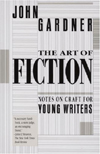 John Gardner’s The Art of Fiction is simply the best book on writing ever written (Update: I read it again in 2014 and I had a harder time with it). It’s brutal, honest and somewhat cold, but pair it with Bradbury’s Zen and the art of Writing, and you’ll have all the passion and inspiration you need. I fundamentally believe good writing is good writing – whether it’s fiction or non-fiction or something in between your job as the writer is to get the reader to read the next sentence – that’s the whole story.
John Gardner’s The Art of Fiction is simply the best book on writing ever written (Update: I read it again in 2014 and I had a harder time with it). It’s brutal, honest and somewhat cold, but pair it with Bradbury’s Zen and the art of Writing, and you’ll have all the passion and inspiration you need. I fundamentally believe good writing is good writing – whether it’s fiction or non-fiction or something in between your job as the writer is to get the reader to read the next sentence – that’s the whole story.
On a different day I’d have thought of other books, but these were the first that came to mind. I’ve been influenced by so many things I’ve read in ways no other media could possibly do, except perhaps film. And my debt to books like these is part of why it’s a honor and a privilege to write, and to be read. I hope to write things that end up on some other writer’s list someday.

Thank you for spending so much time on explaining your list.
Sean: Glad someone noticed. This took a surprising amount of time to put together between getting all the amazon links and cover images.
I want to imagine there is a wordpress plugin that would have made it easier, but I haven’t found it yet.
Given the number of your favorite books that I have read and liked, I’ll be looking for several of the ones I haven’t, so thanks for putting this list together (and having put together a post recently with my take on 50 books, and knowing how long it took me without Amazon links or cover art, I’m especially appreciative).
Great list, several of the titles are new to me. I think I’m going to start with the “Conquest of Happiness”.
Hi Scott,
Cool post. Yes, I dig this idea as I think your best posts are the ones that are more expansive and outside of the business arena.
If you enjoyed Miller then you may want to check out Alberto Manguel’s ‘The Library at Night’, another writer with a voracious appetite for novels who’s also an amazing prose writer who argues of the importance of the library in our desire to understand the universe.
Postman’s another great writer and your right that technopoly should be bundled with every tv as an antidote to television’s cultural pogrom. Clifford Stoll in ‘Silicon Snake Oil touches on the same warnings that technology gives and takes at the same time, whilst also arguing that technological advance shouldn’t always encourage adoption, as sometimes the old technologies (libraries instead of digitized books) are better and will endure longer.
Pirsig’s ‘Zen and the Art of Motorcyle Maintenance’ is my favourite novel, and I agree it can be a tough read. But, like you I’ve returned to it again, and again. Pirsig’s explanation of ‘Value Traps’ and the South Indian Monkey trap forced me to re-evaluate my life and quit my job for higher education.
I will definately check out Murchie and Knowles. If you enjoyed Russell’s writings then you’ll enjoy ‘Makers of Mathematics’ (Penguin) which includes Newton and other’s writings on their discoveries which is a joy to read just for the lucidity of their writing.
Suggestions for future posts: Productivity-101, how you structure your day, how you define and establish work that’s going to make you grow, rather than stagnate. More on writing. Films that have inspired you.
Thanks Scott.
Thanks for this list, Scott!
Here are two guesses why there’s no best world essays series:
– translations don’t pay off
– rights clearance for foreign markets is a bitch
The best attempt I know to offer global essays (with varying results) is http://www.eurozine.com/
Nothing much to say than start reading from the list.
Quite delighted to see 2 of my favourites on your list.”Zen and the art of motorcycle..” is the only non-fiction I read more than once.But I didn’t like “Lila”.
Foucaults pendulum is the most difficult book to read but you feel glad that you survived till the end of the book.
Have you read Herman Hesse? Would like to know which is your favourite? Siddhartha is mine.
I have begun using the ‘Now Reading Reloaded’ WordPress plugin on my site – seems to work pretty well. Maybe this helps – keep up the good work!
I’m starting my Scott Berkun book reading recommendation list today. Thanks!
Irish Ghost, English Accent
Scott –
I love your blog and don’t tell you often enough how much I enjoy your opinions and critical thinking. They have me slow down and critically approach design and life and consider approaching them a different way.
One of my favorite books: The Three Laws of Performance: Rewriting the Future of Your Organization and Your Life.
By Steve Zaffron and Dave Logan.
QUOTE: “I didn’t read much from age 8 to 18 (curiously I’ve read voraciously before and after this period – I blame girls and sports)”
Good! Neither did I. Looking back, I wish I could blame boys and guitar playing. Quite unfortunately, I blame mind-numbing math and languages homework. So, there you go… put things into perspective! I envy your reading deprived teenage years ;)
Nice list – thanks for putting the time into it. One comment: I started reading Russell’s The Conquest of Happiness a while ago when you first mentioned it. For non-native speakers of English it’s not a very easy read – the language is somewhat challenging. The phrasing, not the vocabulary. You can tell it was written a while back. It actually takes some will to go through.
I just read “Ignorance – How It Drives Science” by Stuart Firestein. First, whatever you think it’s about from the title, it’s not that. Second, the first 88 pages are the best writing on Science in recent memory (small pages, fast read). The second 88 pages are case examples.
Thanks for the list, especially for giving more than just a line or two about the book and why you liked it.
thanks….good list :-)
If you could choose one what would it be?